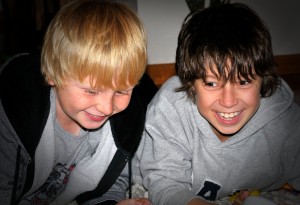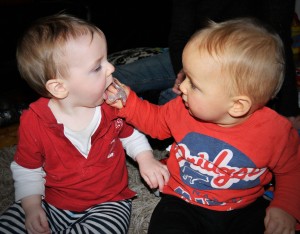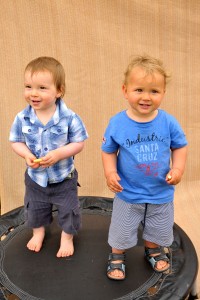“Friendship multiplies the good of life and divides the evil.”
— Baltasar Gracian (1647)
 Friendships are some of the most important relationships we have throughout our lives. How we find them, make them, keep them and interact with them can be all of rewarding, fulfilling, challenging and sometimes even heartbreaking. Our friendship groups change as we develop, as our environment changes and as our needs evolve. For a parent, friendships and friendships groups can be a tricky part of your child’s development, presenting you with a whole range of issues.
Friendships are some of the most important relationships we have throughout our lives. How we find them, make them, keep them and interact with them can be all of rewarding, fulfilling, challenging and sometimes even heartbreaking. Our friendship groups change as we develop, as our environment changes and as our needs evolve. For a parent, friendships and friendships groups can be a tricky part of your child’s development, presenting you with a whole range of issues.
Babies, toddlers and preschool– During this time it is usually us, the parent who is responsible for the bulk of our children’s friendship groups. When we organise play dates at this stage, the company we as a parent must interact with over coffee is usually far more important than the personalities of the stationary babies on the play mat. Our own friends are having babies, we meet others mums in playgroups and Mothers groups and we pretty much decide for our kids who will be their suitable buddy. And let’s face it, whilst there can be interaction and it can be a valuable time to learn skills such as tolerance and sharing, the actual interaction between babies and toddlers is not so intricate that it requires rigorous personality testing.
School Age– Once our children hit the school years they are far more choosy about who they spend their time with. Again these friendships can be ‘manipulated’ (that’s my girlfriends term not mine) to a certain point, but on the whole our children are beginning to decipher the benefits of friendships with mutual interests and personality traits. Friends are often determined by the classes they are in , the sports groups they are a part of and the community and neighbourhood in which they reside. It can be a time too for groups to form, exclusions to be played out, pettiness to creep in and feelings to be hurt. Often the children at this stage are not fully aware of the damage they can be inflicting but it is important from a parents perspective that we are constantly talking to our children about feelings and the effects of excluding others. In saying that though, most kids are pretty resilient with their friendship groups and are often happy to move on if they are not happy with the game being played. And it is very common for kids to say they had no-one to play with that day, when in fact this may have been only true for a very small portion of the time, if at all. I must say my friends with girls often appear to have more ‘dramas’ with friendship groups…but I am more than happy to stand corrected on that!
Teenage Years– In the teenage years, friendship is a whole new ball game and the choice in friendships ultimately comes down to the teenager themselves. They tend to choose their friendships based on common interests, status, values and personalities. This is the time when friends and peers mean everything. At this age our friends are also seen as the source of everything, and hence this can be a challenging time for parents if the friends they have chosen are not seen to be providing the children with all that they need, or more importantly don’t have their best interests at heart. My sister in law gave her daughter some valid advice as she made the transition from primary to secondary school. She advised her that as you seek out a group of girls to hang out with, don’t feel you need to go with the most popular group, the coolest gang or the girls with the ‘highest social standing’. The pressures to keep up in these groups can be enormous, and often the rewards not nearly as worthwhile. Try instead for friends who like you for who you are so that you are never trying to be anyone else but your unique self.
When talking about friendships to your children throughout their childhood, try to get across these important points:
- You don’t have to rely on one friend, it is great to have a large circle of friends. At the same time too, there are some people who are perfectly happy with having just one or 2 good friends that they enjoy, and that is ok too.
- Friends can influence each other in both positive and negative ways…think peer pressure (but that is a whole other post)!
- It takes many skills to make and maintain friendships but it also takes skills to end a friendship when it is no longer mutually beneficial.
- It is ok and certainly beneficial to make friends with the opposite sex.
- Honesty is important in a friendship
- A good friendship should make you feel good about yourself.
Other things a parent can do:
- Don’t try to be one of your kids friends – you can still be a ‘cool parent’ whilst maintaining respect and boundaries. No need to start dressing like them to try and impress either…short skirts and midriff tops are not a good look on mums and I don’t need to see my husband with his pants around his hips so we can see the whole width of elastic and more from his underwear.
- Know your kids friends and their parents if possible– you don’t have to be best friends with their parents and each new friend does not require a full on interrogation, but a couple of words exchanged or a quick chat can make a lot of difference. It also helps to have some sort of relationship with your friends parents in the teenage years as kids are good at working out how to get around different parents and working out which ones enforce the less stringent boundaries!
- Make your home a place for kids to hang out– if your home is welcoming and inviting for your kids and their friends then it is great to know where they are and who they are with. That way we can keep an eye on them without seeming to enforce any overt supervision.
- Keep kids involved in activities they enjoy– this can also lead to forming friendships with those of similar interests and having hobbies and sporting interests keeps kids participating in healthy pursuits.
Have your kids encountered many friendship challenges? If you have boys and girls..have you noticed any differences in the way they resolve such issues?
And whilst these 2 little boys may have come together through the friendship of their mums….that very friendship started out as newborn next door neighbours, was able to thrive, develop and grow, withstand the test of different schools, geography and ultimately time to remain as a friendship that is honest, unconditional and has suffered through the worst that life has dished out and celebrated in its greatest moments too…..sometimes you just happen to get lucky the first time!



This Post Has 8 Comments
What a great post! I have actually been concerned about my 3 year old making friends lately. He recently started preschool and whilst he seems to like alot of the children, I feel he may be too overbearing for some of them. He likes to wrestle and this is definitely not everyone’s cup of tea. My hubby and I continue to explain this to him, but it doesn’t seem to get through. He’s a sweet, loving little boy, but just a dominant type of personality. Maybe we’re expecting too much from him, reading between the lines of your post. After all he is not yet school age, so may not even comprehend the concept of friendships right now.
So confusing as a parent!
But I did enjoy your tips for the future also :o)
Thanks Julie, and I wouldnt be concerned at this stage. My boys have all been a little ‘rough and tumble’ at times, and whilst they still love to wrestle, they now have the ability to know the boundaries of this play and also know when they need to stop if one of them is no longer having fun. But these are skills children learn as they go along and with the help of parents and teachers. There is a big difference between being a bit rough and dominant in play to being violent and agressive, of which your ‘sweet and loving boy’ is obviously not. At 3 years old too, whilst they are becoming aware of other kids, they are still largely playing alongside each other and real friendships and interaction can take a little longer to develop. There is another great guest post this week writen by Kate over at Childhood 101 which talks about these stages of play. http://childhood101.com/2011/05/no-one-will-play-with-me-helping-your-child-make-friends/
Another one for me to bookmark for when my boy is older 🙂
This is a really great post. My three-year-old has started coming home asking if her child care friends can come and stay! Bit early yet, darling!! hehe!
She makes friends so much easier than I ever did as a child. And I really love watching her building a relationship with her baby sister. They already have such a wonderful bond.
She’s really patient and has a lot of empathy for other children. I love watching how she helps other kids when they’re struggling with the concept of sharing or getting frustrated. Wise beyond her years, I think.
She doesn’t tend to act differently between her male and female friends, but more with different personalities.
She sounds like she will make a wonderful friend! And despite all the bickering between my children I love watching my boys play together knowing that hopefully they will always have each other to rely on.
A timely post for me too. One of my kids has a bit of trouble making friends. He doesn’t seem to get it. This post makes me realise how early it is and that I needed worry at all (at least until he goes to school). He is a delightful child and it is only a matter of time until he works it all out. He will be the best friend to someone and I just know that will happen soon. Thanks x
yes…give him time. Like all areas of development kids vary enormously so its important we dont put too much pressure on them and instead let them work things out at their own pace. All my boys vary in how they make friends and how many they have…..as long as they are all happy where they are at then thats what counts 🙂
This post was interesting .. I have a 3.5yr old who makes friends really well… He is careful about his choices and chooses people he has fun with. And he makes these friends easily.
My 6 yr old is in Prep .. not soo easy.. He just cannot seem to connect with kids his own age .. The issues he has making friends breaks my heart every day.. He will do things like force a friendship on a child who treats him terribly.. or be silly and make other kids uncomfortable or talk soo much the kids lose interest … It seems all I can do is try to guide his choices and wait for his social skills to catch up.. and let him know we love him no matter what..
Comments are closed.